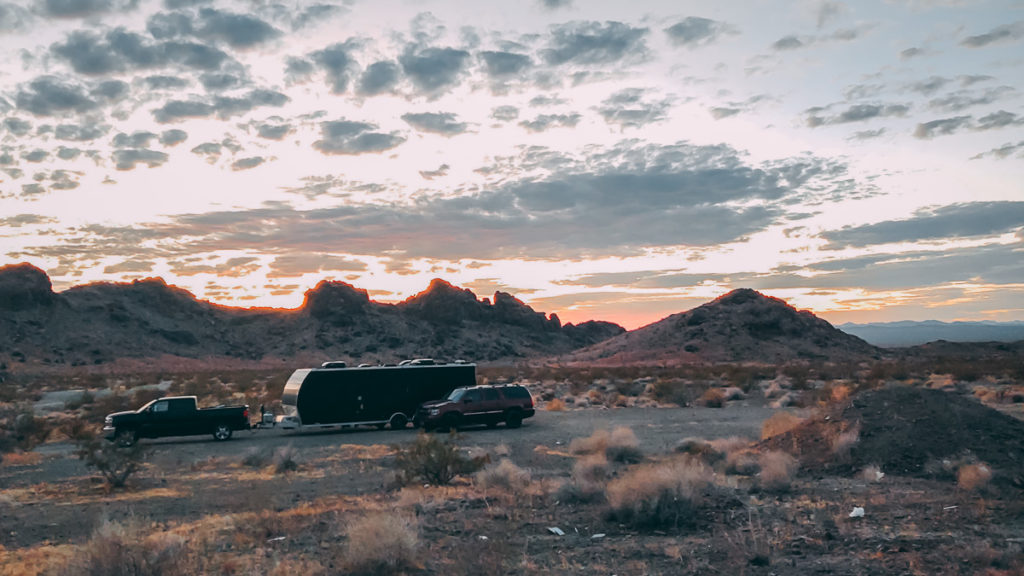Boondocking means camping the more traditional way of being in nature, deep in the woods, or the desert, or up in the mountains, away from town and without public utilities to hook up to. However, boondocking tends to be used with vehicle-based camping, like in an RV or van. Meanwhile, hikers who tent camp, are referred to as “backcountry campers”.

What Does Boondocking Mean?
Boondocking is traditional camping. It’s the way people have historically camped, out in the wild, on open, government land, completely reliant on their own skills and whatever gear they bring. It’s not just camping without hookups, it’s camping where you are free camp wherever you want.
But boondocking usually implies camping with a vehicle, such as an RV, van, car, or pickup truck. You can still set up a tent, but generally you drive in with a vehicle to carry in the amenities of modern living. By contrast, hikers who tent camp, and carry their gear on their backs, is referred to as “backcountry camping”.
Origin of the Word
The word “boondocking” stems from the word, “boondocks”, which originates from the Tagalog word, “bundók” which means “mountain”. The word was brought to the United States by American soldiers fighting the Philippine-American War (1899-1902). The Filipino people used the word as a colloquial for rural inland areas, which on the Philippine islands is generally mountainous, difficult to reach areas.
The phrase, “out in the boonies” stems from “boondocks”.
Among RVers, the word “boondocking” means driving your vehicle into the more remote areas where you’re dependent on your own skills, tools, and supplies.
What Boondocking is Not
- Boondocking is not just dry camping. Dry camping refers to camping without hookups. Boondocking is a form of dry camping, but specifically on public lands where you are free to camp wherever you want. By contrast, dry camping also includes camping in developed campgrounds where there are still no hookups.
- Overnight parking at Walmart, Home Depot, rest areas, or along the wide shoulder of a road, is not boondocking. This is not even camping because the intent is simply to rest overnight and continue driving the next day. Even though some people say they can “boondock at Walmart”, they are really talking about overnight parking.
- Parking on private property, such as casinos, truck stops, someone’s driveway, or on someone’s private land, is not boondocking either. This is instead referred to as “moochdocking”, and is another form of dry camping. By the same token, much of what is available through Harvest Hosts or Boondocker’s Welcome, is not boondocking at all, but a form of moochdocking.
- Boondocking is not necessarily free camping. The term “free camping” also includes the hundreds of free developed campgrounds created by the BLM, USFS, Army Corps of Engineers, and the National Wildlife Refuges. Meanwhile, boondocking is specifically camping outside of developed campgrounds.
Boondocking is Not Cheap Camping
Yes, you can save a lot of money by not staying in RV Parks and campgrounds, but it still costs money to buy gasoline for a generator, having to buy more propane, installing solar panels and battery banks, and having all the tools necessary for boondocking.
Otherwise, boondocking is for people who want to immerse themselves in nature, get away from other people, and find more peace and quiet.
Most boondockers do have a healthy nest egg of funds stocked away. Boondockers are frugal people who love the challenge of living with less, repurposing things, and not having to spend money of stuff they don’t need. See, “Are RV Boondockers Generally Poor People“.
Boondockers are comparable to the modern-day homesteaders and off-grid enthusiasts. Where homesteaders see themselves as living off the land, boondockers see themselves as living “with” the land. They love being free to move from place to place and assimilate into whatever surroundings they set up camp around. See our full length article, “What is Boondocking in an RV?“
Why Boondockers Love Boondocking
Most boondockers started out as hikers who loved to go on long hikes that spanned days and weeks, and pitched a tent each night. Eventually as they got older, their bodies wore out, and could no longer handle the rigors of carrying a pack for days on end. They bought a camper instead, usually a small trailer or a pickup-truck slide-in. They still like hiking and camping, but now do it with some kind of vehicle.
Other boondockers are just solitary people. Many are introverts who need space by themselves and time alone. Many are writers, artists, and musicians who need inspiration that only Mother Nature can give.

